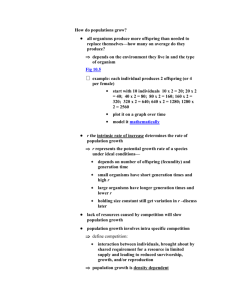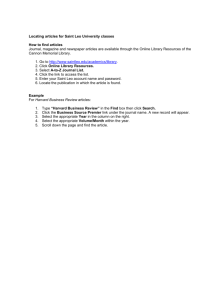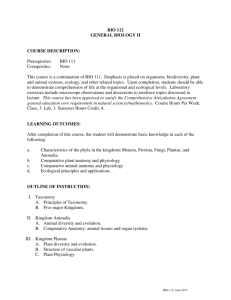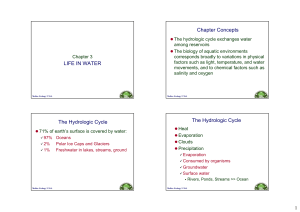BIO 325 syllabus fall 2009 - bio325ecology
advertisement
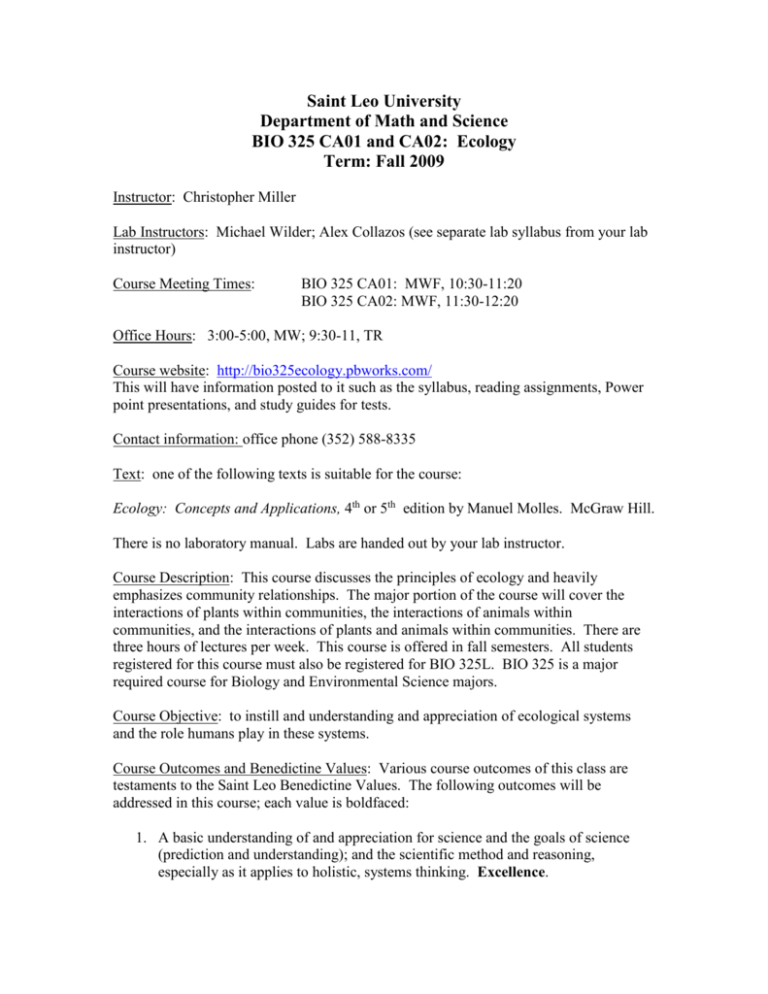
Saint Leo University Department of Math and Science BIO 325 CA01 and CA02: Ecology Term: Fall 2009 Instructor: Christopher Miller Lab Instructors: Michael Wilder; Alex Collazos (see separate lab syllabus from your lab instructor) Course Meeting Times: BIO 325 CA01: MWF, 10:30-11:20 BIO 325 CA02: MWF, 11:30-12:20 Office Hours: 3:00-5:00, MW; 9:30-11, TR Course website: http://bio325ecology.pbworks.com/ This will have information posted to it such as the syllabus, reading assignments, Power point presentations, and study guides for tests. Contact information: office phone (352) 588-8335 Text: one of the following texts is suitable for the course: Ecology: Concepts and Applications, 4th or 5th edition by Manuel Molles. McGraw Hill. There is no laboratory manual. Labs are handed out by your lab instructor. Course Description: This course discusses the principles of ecology and heavily emphasizes community relationships. The major portion of the course will cover the interactions of plants within communities, the interactions of animals within communities, and the interactions of plants and animals within communities. There are three hours of lectures per week. This course is offered in fall semesters. All students registered for this course must also be registered for BIO 325L. BIO 325 is a major required course for Biology and Environmental Science majors. Course Objective: to instill and understanding and appreciation of ecological systems and the role humans play in these systems. Course Outcomes and Benedictine Values: Various course outcomes of this class are testaments to the Saint Leo Benedictine Values. The following outcomes will be addressed in this course; each value is boldfaced: 1. A basic understanding of and appreciation for science and the goals of science (prediction and understanding); and the scientific method and reasoning, especially as it applies to holistic, systems thinking. Excellence. 2. In conjunction with 1., above, develop problem solving skills and collaboration as it applies to team projects in both the field and laboratory. Excellence. 3. Learn and understand the basic vocabulary for understanding ecological principles. 4. Further understand environmental problems that affect the biosphere and humans that live in the global ecosystem. Understand how individuals may make a positive impact on the environment. Integrity. 5. Understand the economic, aesthetic, intrinsic, and ecosystem values of life on earth. Responsible Stewardship and Community. 6. An understanding of the structure and function of ecosystems from which humans derive life support and ecosystem services. Responsible Stewardship 7. An awareness of how humans impact these environments and what we can do to lessen our impacts and live in a more sustainable manner within these ecosystems. Responsible Stewardship and Personal Development 8. instill in students a sense of respect for the environment and how that respect may lead to action on their part. Integrity and Personal Development 9. Understand the economic, aesthetic, intrinsic, and ecosystem values of life on earth. Course Objectives: Upon completion of BIO 325, you should be able to demonstrate a basic understanding of the following: 1. Systems and holistic thinking, modeling, scale, and hierarchies. 2. Fundamental principles of ecology at various scales. 3. Ecological concepts such as niche, laws of thermodynamics, food chains and webs, organismal/environmental interactions, diversity, evolution, succession, nutrient cycles, and environmental processes. 4.The importance of ecology to everyday life. The application of ecological principles to a system of ethics that includes other living entities. Grading: Grades are based upon completion of the following: 3 Tests @ 100 points each Are you prepared?@10 points 2 writing/reading Assignments @ 20 points Final Exam Total 300 70 40 100 510 Tests: The tests are a composite of multiple choice; graphs, charts, and models; short answer; fill-in-the-blank; and essay. They’re hard. I will have a study guide and review session(s) for each test. You get the notes, Powerpoints, and book to help you—so no excuses. You must prepare for them. Are you prepared? Once a week on average we will have an unannounced in-class activity that will be graded. You will not know when this activity will be held. This activity might be one of the following: -a quiz -a ‘clicker’ quiz (to be explained) -a short writing assignment (at the beginning of class typically) -a picture/graph that you will have to identify or explain The purpose of these activities is to ensure that you read the material and come to class on a regular basis. If you do not keep up with the reading and attend class regularly you won’t do well on these ‘are you prepared’ activities. It will help me assess your commitment to the course material. Final Exam: This is mandatory and semi-cumulative, meaning that you will be tested for BIG concepts we covered during the semester. It will be short essay questions that you will receive ahead of time and must prepare before the test. Details forthcoming. Laboratory: Handouts will be given for the lab by your lab instructor. See your lab syllabus. Lab grades are separate from lecture grades. Participation: A note on fieldwork (this applies to fieldtrips, as well): Most of the labs will require a “visit to the field.” We will be going to local habitats in order to sample or conduct experiments. Sometimes this may require working under adverse biotic (e.g. potentially “unpleasant” life forms) and abiotic (potentially “unpleasant” weather, etc.) conditions. Please do not complain about such conditions: THIS IS PART OF THE NATURAL WORLD, THE SUBJECT OF THIS COURSE!! Grade Scale will be as follows: A=479-510; A- =459-478; B+ =444-458; B = 428-443; B- =408-427; C+ =393-407; C =377-392; C- =357-376; D+=342-356; D= 306-341; F <306. When all is said and done (i.e. at the end of the semester), I have very little leniency and little mercy when it comes to grades. You get what you get and don’t make a fit!!! Attendance Policy: Regular attendance is expected and required. Students who miss a class for any reason (excused or unexcused) will be held responsible for the material covered in the missed class, and should notify the instructor ahead of time to arrange make-ups. If an unforeseen emergency arises and a student misses class, the student must make-up the assignment within one week. Permission to make up exams or quizzes is at the discretion of the instructor. Missed labs cannot be made-up. Quizzes, tests, laboratories or take home assignments missed due to unexcused absences will result in the loss of points. Attendance may be taken at the beginning of class time. If you are late you will be marked absent. No more than three unexcused absences will be tolerated; more than three unexcused absences will result in a loss of 2 points of the final grade per absence!!!! Talking policy: No talking is allowed during the class period, except: 1. During discussions, which we frequently will have. 2. If you have something to say to your neighbor about a relevant topic, I do not mind pertinent discussion. However, talking about extra-course material may result in the ejection of the student from class. I very much encourage students to interject ideas, questions, postulations, hypotheses, and personal experiences that relate to the material at hand. ABSOLUTELY NO IDLE CHATTER, BANTER OR PERSIFLAGE OF IRRELEVANCE, HOWEVER!!!! TENTATIVE LECTURE SCHEDULE Date Topic Reading Systems and the Biosphere August 26-28 (also discussed in lab) Introduction. What is Science and the role of Science? What is ecology? What are the Laws of Thermodynamics What is Evolution & Natural Selection? What is a system? What is a Model? What is Holism? What are scale and hierarchies? Ecological vs. Evolutionary scale. And just what the heck is life anyway? Molles, Chapter 1 August 31-September 2 Soils, Climate Molles, Chapter 2 Sept. 4-14 Biomes (terrestrial) Molles, Chapter 2 Reading #1: Ecological interactions paper Due September 14 Sept 16-23 Biomes (aquatic) Sept 25 Test 1: Chapters 1-3 Molles, Chapter 3 Landscape Ecology (real big stuff) Sept 28-Oct. 2 Landscape Ecology Molles, Chapter 21 (and parts of Chapter 23) Oct 5-7 Island Biogeography Molles Chapter 22 October 9-16 Global Ecology Molles, Chapter 23 Monday Oct 12 Mid-Term grades posted Ecosystem Ecology (big stuff) Oct 19-21 Primary Productivity Reading #2: due October 15 Oct 23-26 Nutrient Cycling October 28-30 Succession November 2 Test 2: Chapters 18-23 Molles, Chapter 18 Molles, Chapter 19 Molles, Chapter 20 Community Ecology (sorta big) November 4-6 Species Diversity Molles, Chapter 16 Reading #3: Invasive Species due November 4 November 9-13 Food Webs Molles, Chapter 17 Population Ecology (getting’ small) November 16 Population distribution & dynamics Molles, Parts of Chapters 9-10 November 18-20 Population growth Molles, 11-12 November 23-27 Thanksgiving Break November 30-December 4 TBA Final Exam Schedule: BIO 325 CA01 (MWF 10:30-11:20): Monday, December 7th, 10:10-11:50 BIO 325 CA02 (MWF 11:30-12:20): Wednesday, December 9th, 10:10-11:50 University Policies Americans with Disabilities Act (ADA) Saint Leo University is committed to policies which provide an equal opportunity for full participation of all qualified individuals with disabilities. The University prohibits discrimination on the basis of disability in admission or access to its educational programs and associated activities. The Americans with Disabilities Act (ADA) is a federal antidiscrimination statute that provides comprehensive civil rights protection for persons with disabilities. Among other things, this legislation requires that all students with disabilities be guaranteed a learning environment that provides for reasonable accommodation of their disabilities. Students with documented disabilities who may need academic accommodation(s) should contact Dr. Mary Sloan, Student Activities Center Bldg. B, Room 207 or call x8464. Email contact is: mary.sloan@saintleo.edu. Academic Honor Code The Academic Honor Code is published in its entirety in the Saint Leo University Catalog. The first paragraph is quoted below: As members of an academic community that places a high value on truth and the pursuit of knowledge, Saint Leo University students are expected to be honest in every phase of their academic life and present as their own work only that which is genuinely theirs. Unless otherwise specified by the professor, students must complete homework assignments by themselves (or if on a team assignment, with only their team members). If they receive outside assistance of any kind, they are expected to cite the source and indicate the extent of the assistance. Each student has the responsibility to maintain the highest standards of academic integrity and to refrain from cheating, plagiarism, or any other forms of academic dishonesty. The SLU Academic Honor Code will be STRICTLY enforced. Withdrawal and Incompletes To withdraw from the course the student must go to the Saint Leo University office to sign a withdrawal form. The student is financially liable for the course and the Registrar will record a grade of “F” unless this procedure is followed. Note that there is only a partial refund calculated on a percentage basis depending on the date of withdrawal. See the university schedule online for these dates. “Incompletes” are not given for this course, the instructor will direct you to the Registrar’s Office for withdrawal should the need arise. University Calendar: For holidays and add/drop deadlines and schedules please see: http://www.saintleo.edu/schedule/schedule.aspx?pid=76 or search “schedule” on the Saint Leo University Website. Course Policies (Determined by Instructor) Attendance and Participation Policy Regarding Late Work Policy Regarding Drop/Add (Example) Students adding the course after the first day of class are responsible for making up missed work. The last day to drop this course is the Friday of the first week of class. Changes to the Syllabus (Example) Changes to this syllabus may be made at any time at the instructors’ discretion. Any changes made to the syllabus will be announced with due notice during class time and/or through e-mail. WebCT This is a WebCT enhanced course. We will post materials and communicate with you via WebCT. You will need your SLU student ID number to access WebCT. Please see me if you do not know this number. Turnitin.com This course may require the use of Turnitin.com on specific assignments. Students should be aware that the University subscribes to Turnitin.com. This Website compares students’ written work with billions of pages of content on the Internet. This course may require the use of Turnitin.com on specific assignments. Cannon Memorial Library Services Librarians are available during reference hours to answer questions concerning research strategies, database searching, locating specific materials, and interlibrary loan (ILL). Contact them directly to arrange on-site library/research instruction for your class. 352-588-8258 (This is the main phone number) or online. The library also provides a 1-800 number and an email address for general reference services: 1-800-359-5945 or reference.desk@saintleo.edu. Please check online for access to all online databases, training modules, and other resources. http://www.saintleo.edu/library
